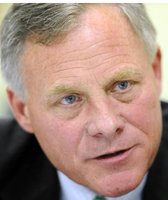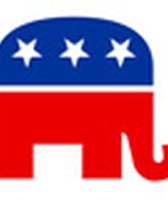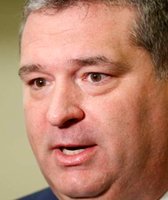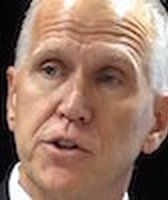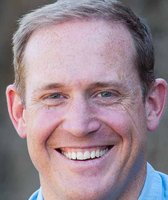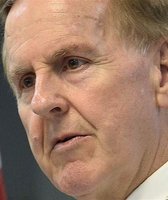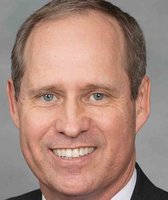Stand up for the facts!
Our only agenda is to publish the truth so you can be an informed participant in democracy.
We need your help.
I would like to contribute
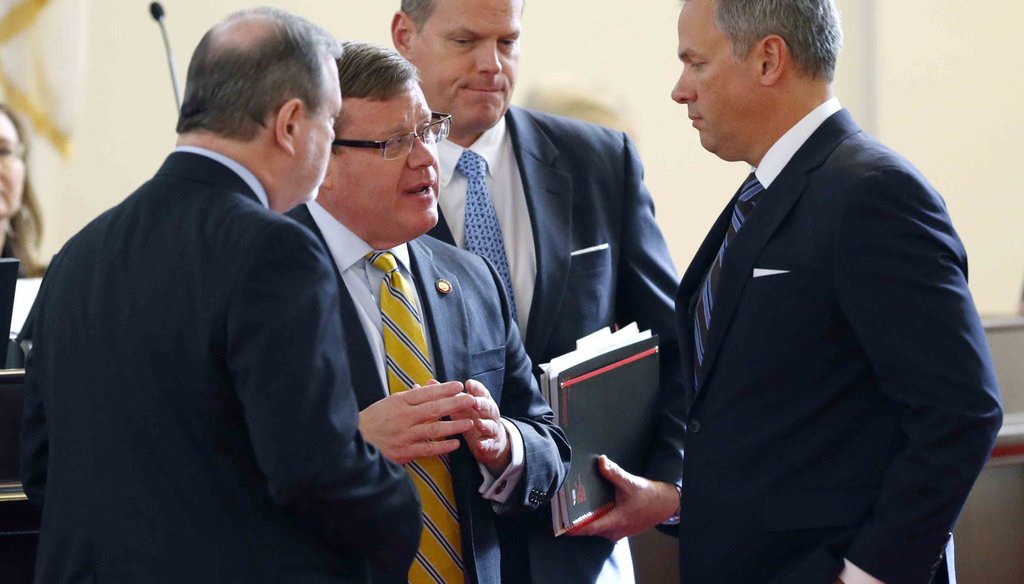
NC Lt. Gov. Dan Forest, right, talks with Republican legislative leaders Sen. Phil Berger, left, and Rep. Tim Moore, second from left. News & Observer photo.
Texas is set to debate a bill similar to North Carolina’s controversial law that limits bathroom access in public buildings and has inspired an economic backlash against the state.
As a show of support to fellow conservatives in the Lone Star State, North Carolina’s Republican Lt. Gov. Dan Forest spoke about his own state’s experiences with House Bill 2. He flew to Texas Monday for a press conference, although Forest said neither state’s government paid for his travel or lodging on the trip.
The Texas bill isn’t exactly the same as HB2 – as our friends at PolitiFact Texas recently explained – but the two are pretty similar. It's called the 'Texas Privacy Act," and is also known as SB6.
In North Carolina, HB2 limited who can use what bathrooms in public buildings, prohibited LGBT people from receiving any statewide discrimination protections and banned cities and counties from passing local pro-LGBT discrimination rules. It also banned cities and counties from changing employment rules related to issues like a higher minimum wage or paid family leave.
Forest made a new claim about the economic impact of House Bill 2 that we fact-checked separately, ruling it True. He also repeated a number of talking points, arguments and numbers related to claims we’ve fact-checked before.
Here are a few of the most prominent claims Forest made:
"The biggest narrative and the one that seems to stick the most is the economic impact narrative – about what’s happened to North Carolina economically."
There’s no way to tell what the "biggest narrative" is, but the economy has definitely been up there – along with debates over civil rights and privacy concerns. Boycotts by sports teams, businesses, conferences and even other state governments have led to much debate over the true impact of the law.
In North Carolina, neither side has managed to get their economic arguments totally right.
Less than two months after HB2 passed, former Democratic Rep. Chris Sgro said North Carolina’s economy had "already lost $500 million" due to the law. We ruled that False because at the time, the state’s economy likely hadn’t even lost half that much.
Sgro was prematurely anticipating several big-ticket losses. Some didn’t end up happening – but others did, and the state’s losses now probably do total around $500 million, in addition to thousands of jobs that went to other states instead of North Carolina.
That led to a Mostly False claim from former Republican Gov. Pat McCrory’s commerce secretary, John Skvarla, last October when he claimed that HB2 "hasn’t moved the needle one iota" on North Carolina’s economy.
"This has never been about anything but privacy and safety and security for women and children."
That depends on who you ask. Supporters of HB2 tend to agree. Critics tend to say the privacy arguments are a veiled way of passing anti-LGBT laws.
Either way, Forest has a history of being wrong about privacy and safety claims.
In April, he said it would’ve been illegal for PayPal to have separate men’s and women’s bathrooms if it had come to Charlotte and Charlotte’s ordinance had been allowed to stand, since the city’s proposed rule would have "opened all bathrooms to all sexes at all times."
Both parts of that claim are wrong, and we rated it False.
Last month, he said a proposal by Democratic Gov. Roy Cooper to repeal HB2 "will create a state-sanctioned 'Look But Don't Touch' policy in our bathrooms."
That isn’t true. When we asked Forest to explain, he cited a scenario that Cooper never actually proposed. We nevertheless looked into that, too, and found it still wouldn’t be true. We rated that claim Pants On Fire.
"If you look at the most extreme instances of economic impact, by the media and by the universities and the people who come out and say ‘This is the impact,’ that most extreme impact equates to one-tenth of 1 percent of our annual GDP."
This is true. For the full explanation, read our fact-check here.
"We’re creating 400 jobs every week, probably, in North Carolina."
Forest is extremely correct. He could’ve doubled this estimate, then doubled it again, and still would’ve been right.
Forest’s argument was that the PayPal job loss of 400 positions isn’t that much in the grand scheme of things. HB2 passed on March 23, 2016, and the boycotts began in early April.
Between then and December (the most recent economic data available), the state added 61,000 jobs. That’s actually about 1,600 jobs a week.
And while that’s a fair point to make, the loss still represents 400 more jobs that North Carolina could’ve had. For a state that continues to have an above-average unemployment rate, every job helps.
Speaking of which...
"We’ve gone from about 9 percent unemployment to about 4.5 percent unemployment."
Forest does a bit of exaggerating here, on both ends. He underscores how bad things were at the height of the Great Recession, and he overshoots the current unemployment rate.
Contrary to what he said, there are actually high school students – and maybe even a few college kids – who weren’t alive the last time the state’s unemployment rate was 4.5 percent or better, which was in January 2001.
In reality, the state’s unemployment rate has been hovering at right around 5 percent for the last year. It was at 5.2 percent in December. North Carolina would have to have another 35,432 jobs (or have more people quit looking for work altogether) for that part of Forest’s claim to be true.
Furthermore, the unemployment rate was as high as 11.3 percent for several months in 2009 and 2010.
"North Carolina just in the last couple years has gone from a billion-dollar deficit to about a $500 million surplus in our economy."
North Carolina isn’t allowed to engage in deficit spending, which is specifically prohibited in the state constitution.
But sometimes the state does experience budget shortfalls, if revenues end up being lower than expected and/or costs end up being higher than expected.
Forest isn’t exactly right about such drastic turnaround "in the last couple years," although he’s not far off. There was a $445 million shortfall in 2014-15 and a $425 million surplus in 2016-17. Next fiscal year the surplus is expected to be $550 million.
And while the shortfall two years ago wasn’t as bad as Forest said, it was just a few years prior – $2 billion in 2012-13.
Our Sources
WRAL-TV, March 6, 2017, press conference video, "NC, Texas lieutenant governors talk bathroom access"
PolitiFact North Carolina, April 8, 2016, "N.C. Lt. Gov. Dan Forest says new state law HB2 prevented a bathroom free-for-all in Charlotte"
The News & Observer, March 6, 2016, "NC Lt. Gov. Dan Forest in Texas to support its HB 2-style bill"
PolitiFact North Carolina, Oct. 28, 2016, "Top North Carolina economic official says HB2 has not harmed the state economy"
PolitiFact North Carolina, May 16, 2016, "Democratic Representative Chris Sgro says North Carolina has already lost $500 million due to HB2"
PolitiFact Texas, March 2, 2016, "Lois Kolkhorst says Texas bathroom proposal 'very different' from North Carolina's law"
The John Locke Foundation, "NC Budget: Recap and Highlights 2016"
WRAL, text of Gov. Bev Perdue’s 2011-13 budget recommendations
Bureau of Labor Statistics, North Carolina employment data from 1976 to present





